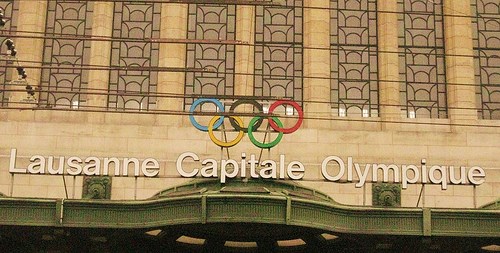As the IOC brand gets stronger, so do the advantages of being situated in Switzerland

Lausanne Olympic Capital (c) Martin Macias Jr/Radio Arte, used under a Creative Commons 2.0 licence
09.10.2009
By freelance journalist Lars JørgensenThe members of the IOC's General Assembly are listed as owners of a billion dollar business with 400 employees in three countries. Most of the IOC's staff work in the "Olympic Capital" Lausanne, Switzerland. Here lies the IOC's headquarters, the Olympic museum, the Olympic Solidarity Fund and a marketing company that sells sponsorship deals and TV rights for the Olympic Games.
For the coming Winter Olympics next year in Vancouver and the 2012 Summer Games in London, the IOC has already sold television rights for 4 billion dollars. This is an increase of 30 percent since the last two Games in Turin and Beijing.
In addition to this, the IOC can expect 900 million dollars from global top sponsors and so far the local partners in the next three Olympic cities; Vancouver, London and Sochi have invested 1.6 billion dollars in the Olympic rings.
"The IOC brand is stronger than ever. Despite financial crisis, our earnings are really good. And after the election of Rio de Janeiro as host city of the Olympics in 2016, we also see great opportunities in South America," stated the Norwegian IOC member Gerhard Heiberg, chairman of the IOC's marketing commission yesterday at the IOC Session in Bella Center in Copenhagen in his report on the Olympic business.
Coca-Cola and McDonald's
Besides the headquarters in Lausanne, the IOC has two smaller branches in Spain and the United States. In Madrid lies the Olympic Broadcasting Service. And in Atlanta, the IOC has its U.S. marketing company close to its major sponsor Coca-Cola, but also in the vicinity of broadcaster NBC, burger chain McDonald's and electronics giant General Electric, companies who along with other American sponsors provide 80 percent of IOC's revenue.
The IOC has had its headquarters in Lausanne since 1915. During the 1st World War, the founder of the modern Olympic Games, the French baron Pierre de Coubertin, fled Paris and took his life's work with him to neutral Switzerland. Although the IOC since the 1980s has evolved into a billion dollar business, the IOC is registered as a non-profit sports association. This means that the committee does not have to pay 20 percent income tax.
"The tax exemption is very important. I have no concrete figures on how much we save in dollars and cents. But the tax exemption means that we can spend even more money on our Olympic solidarity work," said Gerhard Heiberg in an interview with Danish newspaper Information.
But the tax exemption is not the sole privilege of the IOC in Switzerland. Bank details on financial transactions kept secret from the public. Foreigners automatically get residency and work permit if they work for the IOC. And other Olympic sports federations, set up in Lausanne, pay no rent for the first two years.
The IOC argues that the Committee retains only seven percent of its revenue for the day-to-day operation and administration. The rest is divided among the 205 Olympic countries. However, the U.S. receives more than all other countries combined in gratitude for the Games in Los Angeles in 1984, which became a commercial success and created the foundation for the IOC's strong economy.
Lausanne - Olympic Capital
Switzerland is the greatest Olympic winner. In Lausanne alone, 850 employees work with international sports administration. A total of 30 international sports federations are based in Switzerland. In addition to this, Lausanne houses several European sports federations, 20 other sports-related organizations such as the international sports court CAS, and an army of sports and marketing consultants, agents and other sports merchants.
The Swiss government has repeatedly considered limiting the IOC's tax advantages, latest during a debate in parliament in January this year. So far the interests of the country’s revenue from the sports industry weigh heavier than political principles. The development of the IOC also benefits the Swiss tourism industry, which is closely related to the sports industry. Over the past 15 years, Switzerland has secured the hosting of 107 world championships, which has increased tourism revenues.
Bribes are legal
Switzerland is also where the recent Olympic corruption scandal took place. One year ago, a trial in Zug documented that sports marketing company ISL for years used bribes to obtain contracts with Olympic sports federations. From 1989 until the company's bankruptcy in 2001, the ISL paid at least 138 million Swiss francs in commissions to Olympic sports leaders. In return, they made sure that ISL got TV and marketing contracts with the Olympic federations.
Read more here (download pdf): The ISL bribery system: 138 million CHF for senior officials in the Olympic world
FIFA president and IOC member, Swiss Sepp Blatter and his Brazilian predecessor, IOC member João Havelange, are among Olympic leaders who are suspected of having accepted money from the ISL. Besides a leading ISL employee and former Adidas director Jean-Marie Weber, who escaped from the trial with a small fine, no one have been convicted in the case. According to Swiss law it was not illegal to pay commission under the table at the time of the trial.
And the widespread corruption does not seem to be in breach of the IOC ethics stated in the Olympic Charter. With an observer status at the IOC's summit in Copenhagen, Jean-Marie Weber is still a member of the Olympic family.





